|
|
Presentation on developments in the garment industry in Cambodia
and RGC’s policy responses |
By H.E. CHAM Prasidh
Senior Minister and Minister of Commerce
At the 14th Government-Donors Coordinating Committee (GDCC)
Phnom Penh – April 28, 2009 |
|
Cambodia’s
total textiles and garment exports to the various markets
(2004-2008)
Value in US$ million |
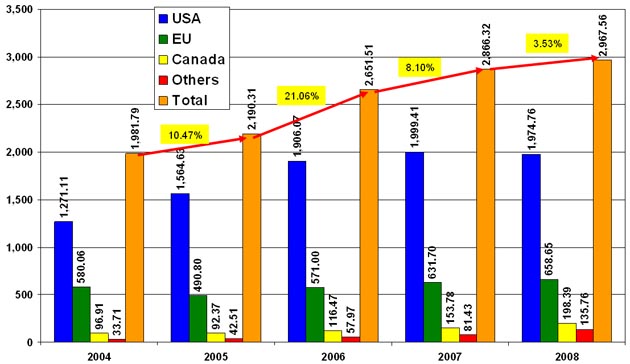
|
Source: MOC March 27,
2009 |
Total exports: $552.2mn – Data of April 27, 2009 |
|
|
Monthly
Cambodian Garment Exports to the World (2006~2009) |
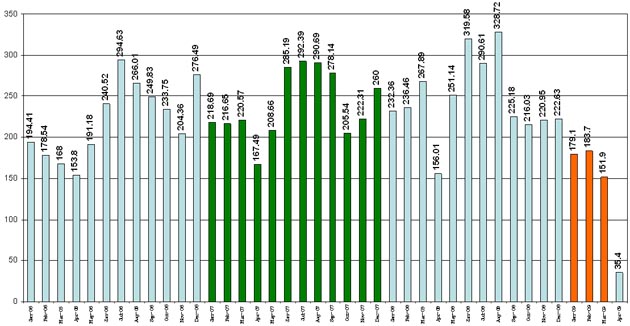
Source: MOC April 27, 2009 |
|
Number of
textile and apparel factories in Cambodia
(Jan 2008 – Dec 2008) |
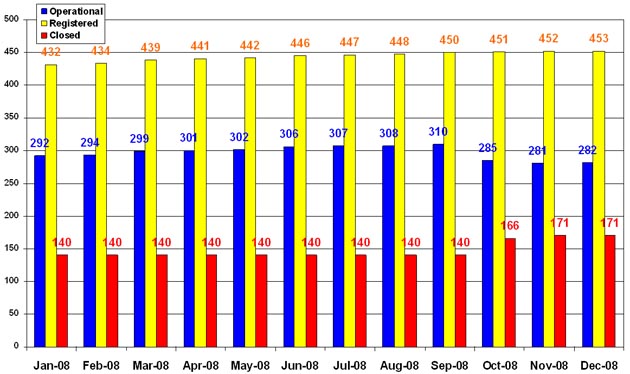 |
|
Number of
textile and apparel factories in Cambodia
(Jan 2009 – Dec 2009) |
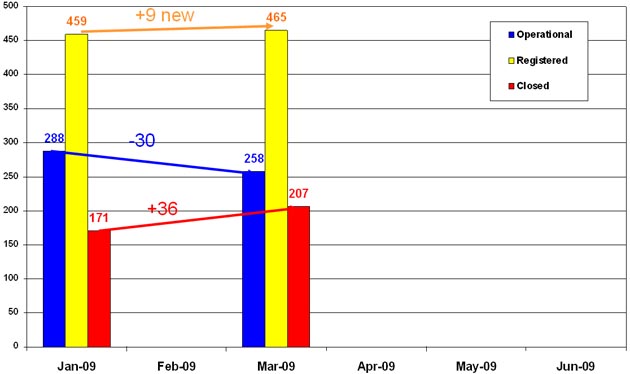
Source: MOC/DTPS April 2009 |
|
Workforce
monthly evolution in the garment sector
(Jan 2008 – Mar 2009)
(1,000 persons) |
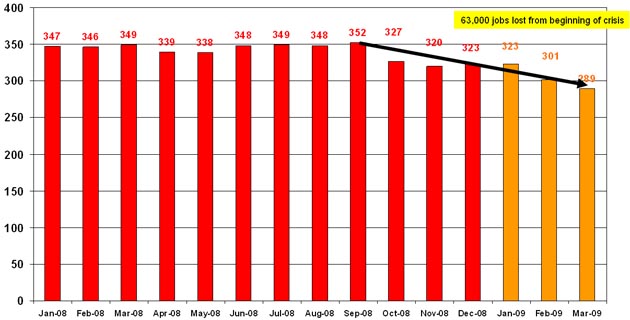
Source:
MOC April 2009
|
|
Payroll
monthly evolution in the garment sector
(Jan 2008 – Feb 2009) |
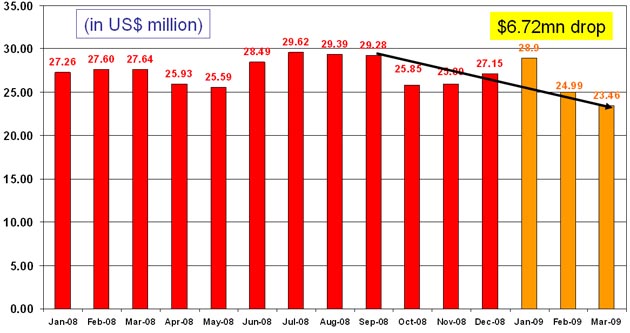
Source: MOC April 27, 2009
|
|
Note: These measures
are applicable to garment sector and footwear sector
|
|
Based on the results of
a joint meeting of the Economic and Fiscal Policy Committee and the
Private Sector Development Steering Committee, chaired by DPM and
MEF Minister H.E. Mr. KEAT Chhon on February 11, 2009
H.E. Samdech Akka
Moha Sena Padei Techo HUN SEN, Prime Minister of the Kingdom of
Cambodia has agreed as follows:
|
-
1% Advanced Profit tax: RGC since last
year has decided to waive this measure for 2009 and 2010 for the
garment sector in order to ask the GMAC to raise wages – now GMAC is
asking to abolish that measure – this is part of the Law on
Taxation, and is related to all types of companies, not just for the
garment sector – the suspension for garments sectors is a loss of
50bn Riels for the RGC based on 2008 data – we ask the garment
sector to understand and as a compromise, the
Royal Government agrees to further waive the collection of the 1%
Advanced Profit Tax for 2 more years (2011 and 2012).
-
Safety net pensions (Factory management
is required to secure 0.8% of wage per month)
the Royal Government agrees to reduce factory management’s burden to
0.5% of wage per month while RGC pay 0.3% to help complement the
payment of those pensions for the period 2009-2010.
[Productivity of the workers need to be
enhanced – need forengagement from factories – in the medium term,
we suggest that each factory join RGC in training program for senior
and middle managers and unions (possible deductible expenses, not
charged into profits tax) – ongoing USAID project]
-
The Royal Government
agrees to create a Fund for vocational training for laid off workers
( not just to cope with current unemployment/purchasing orders drop
problems, but to increase productivity in the sector, too). MEF and
MLVT are tasked to prepare a formal request to the Prime Minister.
-
We shall look for a
more permanent mechanism in which the garment/footwear management
can contribute on a proportional basis of each factory’s size or on
a voluntary basis. This expenditure can be profit tax deductible.
|
|
2.
Streamlining procedure |
[Reduction of costs of transactions
(not business as usual) – find immediate "lower hanging fruits and
quick win" such as online approval]
-
The Royal Government
agrees to push for a speedy and complete implementation of ASYCUDA
World for imports and exports customs clearance
-
The PSD Steering
Committee and its 3 Sub-steering Committees as well as the 8
Government-Private Sector Working Groups shall meet more frequently
and more efficiently to streamline procedures and to reduce formal
and informal transactions costs.
|
|
3. Trade
financing and guarantees |
-
locally the cost is higher and the risk
is higher
-
difficult to guarantee on a higher risk
sector
-
Global Trade Financing Facility of IFC
does exist (ACLEDA is the last resort) – need more study- no
immediate action possible – GMAC may jointly study with IFC and come
out with findings for our purview
-
The Royal Government
agrees to commission further study on possible government’s
involvement while bearing in mind the need to secure a healthy
banking sector in Cambodia.
Note: Maybe the forthcoming
implementation of the ASEAN+3 project called “Chiang Mai Initiative”
could be an opportunity to tap on the pledged $120bn Fund.
|
-
The Royal Government
agrees to call for further tripartite meetings
(Government-Workers-Unions) and the 8th WG on Industrial Relations
to stress the role and responsibility of each key player.
-
The Royal Government
will push for a quick resolution on the issue of unions’
representativeness in the factories and “collective agreement”
between unions and managers.
-
The Royal Government
urges MLVT to speed up with drafting of the Law on Unions (based
on current provisions in the Labor Law and without waiting for the
arrival of a Labor expert)
|
-
The Royal
Government calls on all government entities and local authorities
to help combat garment products’ pilferage for the sake of IPR
protection and keeping purchasing orders.
-
The Royal
Government calls on factory management to enhance management’s
capability and internal governance.
|
|
Thank you for
your attention |
|
|


